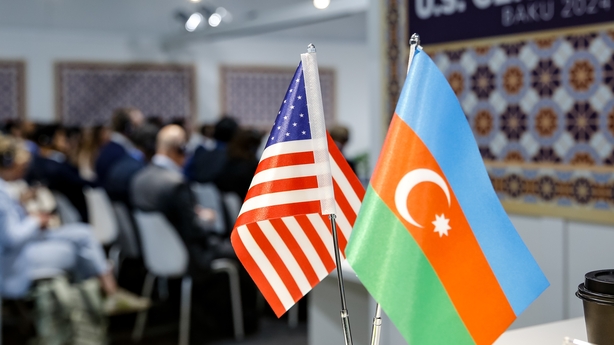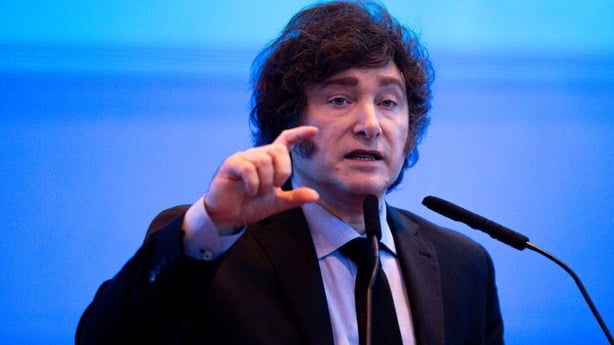Countries at the COP29 summit tried to make progress on how to raise up to $1 trillion in climate finance for the world's most vulnerable, as political tensions overshadowed the talks.
Most of the seventy-two thousand people registered for COP29 will be disappointed with analysis from the scientists at Climate Action Tracker today showing that, despite all their efforts, the world is still heading for 2.7 degrees Celsius of warming by the end of this century.
That is unchanged now for the past three years.
According to climate scientists this means unimaginably worse extreme weather disasters than we are seeing now.
The Director of the ICARUS Centre at Maynooth University Peter Thorne is attending the COP negotiations in an official capacity for the Global Climate Observing System. He said we are already at roughly 1.3 degrees Celsius on a sustained basis.
"The thing to be crystal clear about, is that climate impacts from rising temperatures increase sharply and in a non-linear fashion. Warming of 1.3 degrees might be bad. But 2.7degrees is unimaginable", he said.
"This is more than worrying," he added.
"It is my children's future; it is everyone’s children’s future. We are deliberately impoverishing future generations. We are the first generation that is knowingly making the future for our children and our grandchildren worse."

Tensions are high at COP29. The poorest countries know they will suffer the most and worry that Donald Trump’s election in the United States means less climate action.
Some expressed humiliation at having to beg for climate finance from the rich countries responsible for climate change in the first place.
Sandra Guzman, the director of the Climate Finance Group for Latin America and the Caribbean, said the problem is not a lack of money to finance the fight against climate change, but rather a lack of political will.
"If we reduce the fossil fuel subsidies, if we tax the richest, we could already be generating sources to pay for climate change. So, it's not a lack of money. It's a lack of a political will to allocate that money where it is needed", she said.
"I think the concern for many developing countries is that climate change is already taking lives and is taking infrastructure. This is costing money. Who will pay for that?" she added.
After three years of behind-the-scenes-squabbling over climate finance, the COP negotiators finally published a first draft decision text last night, to guide negotiations towards some version of agreement over the next eight days.
Perhaps what is most striking about this document is that it is 36 pages long.
This compares with just nine pages before it was put on the table as an agreed outline for progressing the talks.
The implication is that a host of undecided and contentious issues have been reintroduced into the draft text because they are still to be decided.
That suggests there will be quite a battle in the negotiation rooms over climate finance before the talks reach some kind of conclusion at the end of the next week.
The likely withdrawal of the United States from any future funding deal will raise pressure on delegates to find other ways to secure the needed funds.
Among them are the world's multilateral development banks such as the World Bank, funded by the richer countries and in the process of being reformed so they can lend more.
Ten of the largest have said they would plan to increase their climate finance by roughly 60% to $120 billion a year by 2030, with at least an extra $65 billion from the private sector.

More division than unity
So far the conference - which many global leaders decided to skip altogether - has been marked more by division than unity.
French climate minister Agnès Pannier-Runacher yesterday cancelled her trip to COP29, after Azerbaijan's President Ilham Aliyev accused France of "crimes" in its overseas territories in the Caribbean.
France and Azerbaijan have long had tense relations because of Paris' support of Azerbaijan's rival Armenia. This year, France accused Azerbaijan of meddling and abetting violent unrest in New Caledonia.
"Regardless of any bilateral disagreements, the COP should be a place where all parties feel at liberty to come and negotiate on climate action," European Union climate commissioner Wopke Hoekstra said in response, in a post on X.
That followed Mr Aliyev's opening speech at the conference that accused the United States and EU of hypocrisy for lecturing countries on climate change while remaining major consumers and producers of fossil fuels.
Argentina's government withdrew its negotiators today from the COP29 talks.
Argentina's President, Javier Milei, has previously called global warming a hoax. He is due to meet Mr Trump, also a climate change denier, later this week.
We need your consent to load this rte-player contentWe use rte-player to manage extra content that can set cookies on your device and collect data about your activity. Please review their details and accept them to load the content.Manage Preferences








